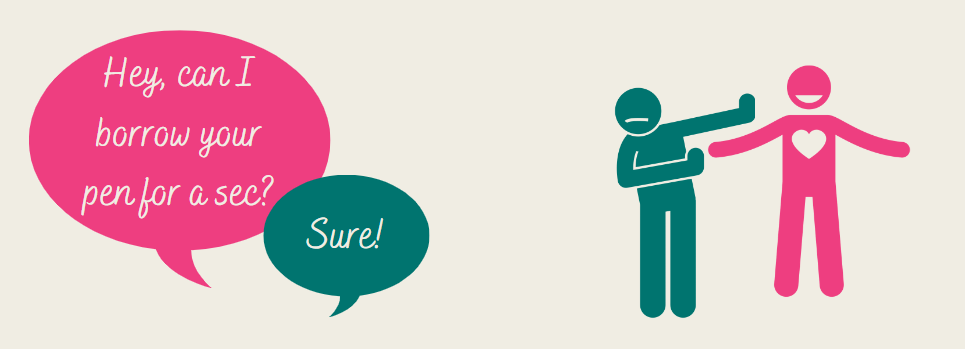The word “consent” comes from the Latin words con and sentire. Con means “together” and sentire means “feeling.” Together, they form the word consentire, which in English translates to “consent.” Broadly, consent as a noun means permission for something to happen or an agreement to do something. As a verb, consent is to give permission for something to happen or to agree to do something.
Basically, consent is permission one person gives to another person to do something.
We practice consent in our daily lives all the time! When we ask someone if we can borrow their property, that’s practicing consent. We even practice consent non-verbally, like when we open our arms, non-verbally asking for a hug, and the other person gives us a non-verbal signal that they don’t want a hug. 
Consent is always important, but it is especially important when it comes to sexual activity.
CONSENT IS REQUIRED.
As defined by the University of Tennessee’s Policy on Sexual Harassment, Sexual Assault, Dating and Domestic Violence, and Stalking, consent is “an active agreement to participate in a sexual act.”
words = spoken, written, or signed language
conduct = non-verbal body language, movements, or behaviors
- vaginal intercourse (penile-vaginal intercourse)
- anal intercourse (penile-anal intercourse)
- oral sex (mouth-to-genitals or mouth-to-anus)
- any other intrusion, however slight, of a person’s finger (i.e., digital penetration) or any other object into any other person’s genitals or anus
- the intentional touching of a person’s intimate parts (genital area, groin, inner thigh, buttock, or breast)
- the intentional touching of the clothing covering the immediate area of a person’s intimate parts
- the intentional touching of any other person with that person’s own intimate parts, if that touching can be reasonably construed as being for the purpose of sexual gratification
Consent is ALWAYS REQUIRED to engage in sexual activity with someone. If sexual activity happens without consent, it’s SEXUAL ASSAULT.
Components of Consent
Clear (adjective) – “easy to perceive, understand, or interpret”
It should be abundantly clear if someone has given consent or not.
Clear consent can be a mixture of affirmative verbal and non-verbal messages.
(The presence or absence of consent is evaluated based on the totality of circumstances. This is not an exhaustive list of examples.)
Signs of Clear Consent
- Saying things like:
- Yes!
- I’m sure
- Don’t stop
- I like that
- Nodding head “yes”
- Initiating sexual activity
- Reciprocating and progressing sexual activity
Mutual (adjective) – “(of a feeling or action) experienced or done by each of two or more parties toward the other(s); held in common by two or more parties”
Communicating consent is the responsibility of ALL parties involved. It is a mutual responsibility.
Both the ASK for sexual activity and the ANSWER should be CLEAR.
Ongoing (adjective) – “continuing; still in progress”
Consent is NEVER a one-time thing. It is an ongoing process.
It is important that partners continually check in with one another during a sexual interaction.
There is no such thing as “blanket” consent. You must ask for consent each time you want to engage in sexual activity with another person.
Revocable (adjective) – “capable of being revoked (canceled, taken back, withdrawn)”
People are allowed to change their minds. A person who has given consent can revoke that consent.
Once consent is revoked, the activity must STOP.
Specific (adjective) – “clearly defined or identified”
The sexual activities you want to engage in with your partner(s) should be clearly specified.
Our language should also be clear and specific.
Informed (adjective) – “(of a decision or judgment) based on an understanding of the facts of the situation”
A person should KNOW what they are getting into. This includes:
- Specific behaviors you do or do not want to engage in.
- If you have any sexually transmitted infections (STIs; see the “sexual exploitation” section of the Policy).
Voluntary (adjective) – “done, given, or acting of one’s own free will”
The decision about whether or not to have sex, when, with whom, and under what conditions is a personal one. Consent is something that is only voluntary, not something that can be coerced or forced. If it isn’t an active agreement to participate, it’s sexual assault.
Non-Consent
What does non-consent look and sound like?
(The presence or absence of consent is evaluated based on the totality of circumstances. This is not an exhaustive list of examples.)
- Their verbal and non-verbal communication doesn’t match;
- You think you are getting non-verbal consent but aren’t 100% sure;
- They haven’t given any verbal or non-verbal communication.
- Saying things like:
- I’m not sure
- I want to, but…
- Maybe
- Not reciprocating or progressing sexual activity
- Seems checked out or uncomfortable
- Tense or stiff body language
Who cannot give consent?
A person who is incapacitated.
- A person violates this Policy when they engage in sexual activity with another person who is Incapacitated under circumstances in which a reasonable person would have known the other person to be Incapacitated. For evaluating Incapacitation, a “reasonable person” means a sober, objectively reasonable person in the same situation, with ordinary sensitivities, and with similar identities as the Respondent.
- Incapacitation can be voluntary or involuntary. Signs of Incapacitation may include, without limitation: sleep; total or intermittent unconsciousness; lack of control over physical movements (e.g., inability to dress/undress without assistance; inability to walk without assistance); lack of awareness of circumstances or surroundings; emotional volatility; combativeness; vomiting; incontinence; unresponsiveness; and inability to communicate coherently. Incapacitation is an individualized determination based on the totality of the circumstances.
A person who is forced.
- Physical force (e.g., hitting, punching, slapping, kicking, restraining, choking, kidnapping, using a weapon, blocking access to an exit);
- Words and/or conduct that would cause a reasonable person to fear:
- Physical force or other harm to the person’s health, safety, or property, or a third person’s health, safety, or property;
- Loss or impairment of an academic benefit, employment benefit, or money;
- Disclosure of sensitive personal information or information that would harm a person’s reputation;
- Disclosure of video, audio, or an image that depicts the person’s nudity or depicts the person engaging in a sexual act(s); or
- Other immediate or future physical, emotional, reputational, financial, or other harm to the person or a third person.
A person who is not of the age of consent under state law.
You Are Not Alone.
If you or someone you know has experienced sexual assault or other sexual misconduct, you are not alone. There are resources on campus, in the community, and online that can support you. Click here for a comprehensive list of resources.



